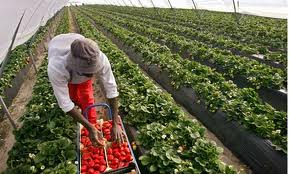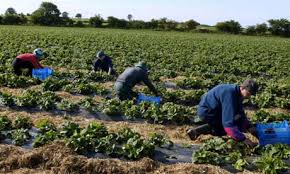At Incredible Edible Mytholm’s Growing Futures Field Day yesterday, Charlie Clutterbuck explained why the Agricultural Wages Board (AWB) is worth saving from the Coalition Government’s “bonfire of the quangos”, and that people can urge MPs to vote against its abolition when the proposal comes back to the House of Commons on April 16th.
Save the Agricultural Wages Board
You can use the Save the AWB site for information. LibDem MPs can vote against abolition, as it is not in either their Manifesto nor the Coalition Agreement. Our Tory MP Craig Whittaker will no doubt toe the party line, but it’s always worth letting our MP know if you don’t agree with that.
The AWB has been in operation since the 1940s. It was set up to establish an agreed pay scale for land workers (whoever employs them), based on 5 levels of skills. This creates a career ladder, so that when a land worker gains a new set of skills, this automatically moves them up the payscale.
This link between skills and pay is vital if land work is to attract young people to enter farming, by providing a viable career choice. Abolishing the AWB will abolish this career ladder, and make it even harder to renew the ageing farm workforce with young people.
Skills for a fair, sustainable food system
Charlie described fair sustainable food as “food that is healthy for people and the planet”.
To build a fair, sustainable food system needs people with the right skills.
Charlie is working with Incredible Farm on their permaculture growing apprenticeship scheme, which has started with two apprentices who are doing amazingly well, according to Incredible Farm’s Nick Green.
Lantra (the land-based skills council) needs to make sure that people can develop the necessary skills at all levels – from level 1 (becoming ready for work), through land workers (level 2), to what Charlie described as “practitioners/doers”(level 3) – people like technicians, supervisors, union reps, who translate sustainable food policy into action- and finally, environmental managers and others (level 4) who work out what people need to do to make a fair, sustainable food system work.
Charlie described Lantra’s task of developing fair, sustainable food skills as “an uphill task”, for reasons that are to do with the decline of public sector support for the development of land work skills.
He cited the absorption of specialist agricultural institutes into universities, who then sold them off because the value of the land was more important to them than the educational value of developing and passing on land work skills. Universities that used to teach agricultural science courses have closed their departments. Another factor has been cuts to Defra’s country-wide network of agriculture and horticulture experimental/research stations, now reduced from 32 to 8.
This has seriously reduced the UK’s capacity to deal with plant and animal diseases – for instance, UK forestry folk knew ash die-back disease was coming, but had no forestry science research resources to work on ways of dealing with the disease.
Charlie was enthusiastic about the possible role of Growing Futures as a permaculture experimental/research station, linked into a network of other groups investigating and sharing the applied science of fair sustainable food growing.
Charlie said,
“The public sector has virtually gone in agricultural science – there’s too much now in corporate hands. There’s not enough balance now.”
Bit of background on ConDem’s proposed abolition of the AWB
The debate in the House of Lords on the abolition of the Agricultural Wages Board was held in early March. A Labour amendment to keep the main AWB was co-sponsored by Bishop of Hereford, Baroness Trumpington (ex Ag Minster in Thatcher government – check out her gesture on YouTube) and Lord Greaves (Lib Dem), but was narrowly lost. The abolition now comes to the House of Commons on April 16.
Charlie described some of the Tory motives for abolishing the AWB, shenanigans they have resorted to when faced with substantial opposition, and the total illogicality of the idea.
“Plantation” farms want to ditch the AWB
The main impetus for abolishing the AWB comes from the farm sector that Charlie described as “plantation agriculture” – big farms, mainly in the East of England, with huge fields, that attract big subsidies via the Common Agriculture Policy (CAP) Single Payment Scheme.
The Tories are going along with the “plantation farms”, both by proposing to abolish the AWB and by resisting proposals in the European Union to have a maximum level of farm subsidy payments via the Single Payment Scheme.
Perverse effect of AWB abolition would be to require opening up land work to non-EU migrant workers
Abolishing the AWB would have the perverse effect of reducing the attractiveness of farm work for the EU migrant workers who currently do the bulk of the land work on these plantation farms. Land work would then pay no more than the minimum wage, and EU migrant workers would move into other minimum wage work with better conditions – like bar work, food processing etc – that doesn’t involve being outdoors, exposed to the weather, and getting up before dawn to be at work.
This would cause a shortfall of workers for the plantation farms, and they know it. They are now lobbying the Coalition government to allow them to bring in migrant workers from non-EU countries such as Russia and Ukraine, following the abolition of the AWB. Duh!
The AWB covers England and Wales, but the the Welsh Assembly has voted to keep the AWB. In order to overcome this substantial oppostition, the Coalition government did some diddling that transferred the AWB into a different category of legislation, that the Welsh Assembly Government could not vote against.
The upshot?
The clear message from Charlie’s talk is that building a fair, sustainable food system depends on making sure that it’s possible for young people, and those already working on the land, to develop the necessary skills and to have decent employment conditions and wages that reflect their skills.
It’s also clear that there are strong political forces ranged against the development of a fair, sustainable food system, with its need for decent working conditions and a skilled workforce.
Where is John Steinbeck when we need him?




